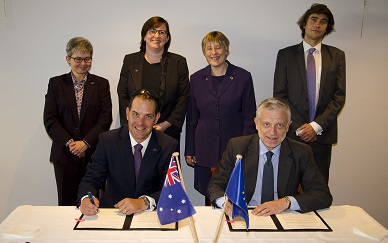Access to vital satellite data for Australia, South East Asia and the South Pacific has been guaranteed through the signing of a cooperation arrangement in Brussels on Wednesday, 4 November 2015. The arrangement was signed between the European Commission, represented by Philippe Brunet, Director of Space Policy, Copernicus and Defence and the Australian Government, represented by Stuart Minchin of Geoscience Australia. It enhances access to Copernicus, the EU’s Earth Observation and Monitoring programme, which captures data and imagery of our planet and its environment for the benefit of citizens. Thanks to a variety of technologies from space-based satellites to ground, sea and air-based measurement systems, Copernicus delivers operational data and information services openly and freely for a wide range of applications.
The European Union’s Ambassador to Australia, Sem Fabrizi, warmly welcomed the announcement and the prospect of greater Australian involvement in Europe’s cutting-edge work in earth observation. “This agreement paves the way for Australian experts to access highly-detailed data from all the Copernicus Sentinel satellites, including one which was sent into space last June from the European Spaceport in French Guiana,” Ambassador Fabrizi said.
“The European Union’s policy of providing full, free and open access to data from this programme creates significant opportunities for European and Australian industry to work together to utilise this data.
“Our industries will be able to collaborate to develop new highly exportable digital products and services that will create jobs and increase economic prosperity.”
Every day, Copernicus will deliver comprehensive snapshots of Australia and the surrounding region. This data will provide unparalleled insight into how our natural resources, environment and cities are changing.
Copernicus’ full, free and open data policy will stimulate the development of digital products and services that increase industrial productivity, create business opportunities, encourage cutting-edge research and improve public policy making.
Cooperation between the European Union and Australia will also enhance data access and analysis, increase interoperability between satellite datasets, and facilitate innovation and industry engagement.
Under this arrangement, Australia will support access to data throughout South East Asia and the Pacific through a Data Hub. The Australian Government in partnership with the governments of New South Wales, Queensland and Western Australia will establish this Data Hub. Australia’s Assistant Minister for Science Karen Andrews applauded the arrangement, which will provide Australia and the region with access to the most comprehensive Earth observation programme ever:
“Through our research sector, spatial industry, and our national science agencies Geoscience Australia and CSIRO, we see this creating great opportunities for businesses small and large in Europe and Australia to work together to create innovative, economy-changing products and services.”
The longevity of the Copernicus programme will also give European and Australian industry increased confidence when it comes to cooperation and investment in the development of new applications and services relevant to European and Australian users in sectors such as agriculture, fisheries, transport, mining and energy.
Furthermore, enhanced regional access to data will open up new markets for the export of value-added products and services that harness Earth observation data.
This will support Europe and Australia when they engage with regional players on key issues such as disaster risk reduction and the development of the blue economy.
“We are delighted that through this Copernicus Cooperation Arrangement, Australia and the European Union will reinforce their mutual support for Earth observation. The combination of Australian and European expertise in remote sensing and data management represents great potential for Europe and the South-East and Pacific regions,” noted Dr Brunet.




